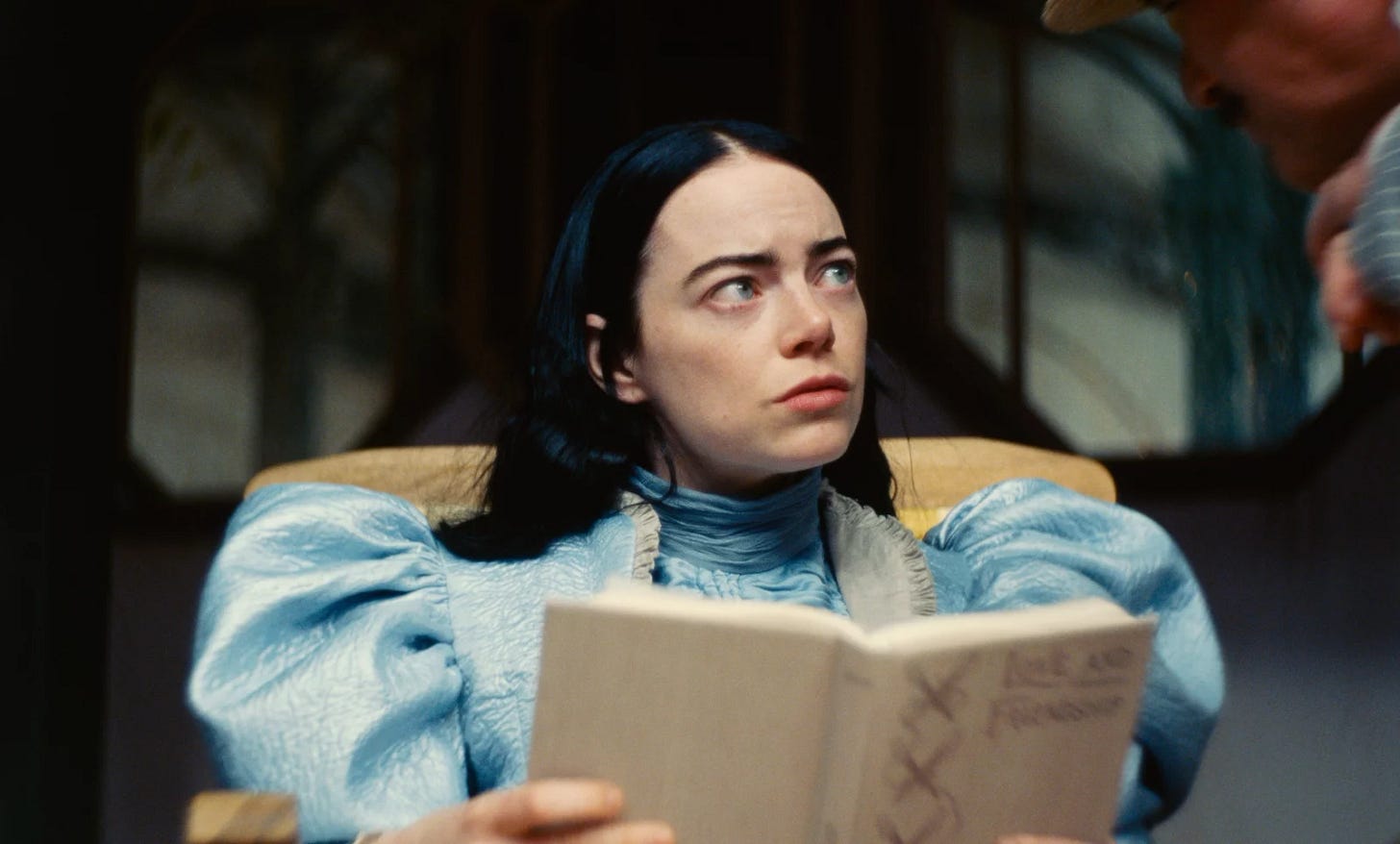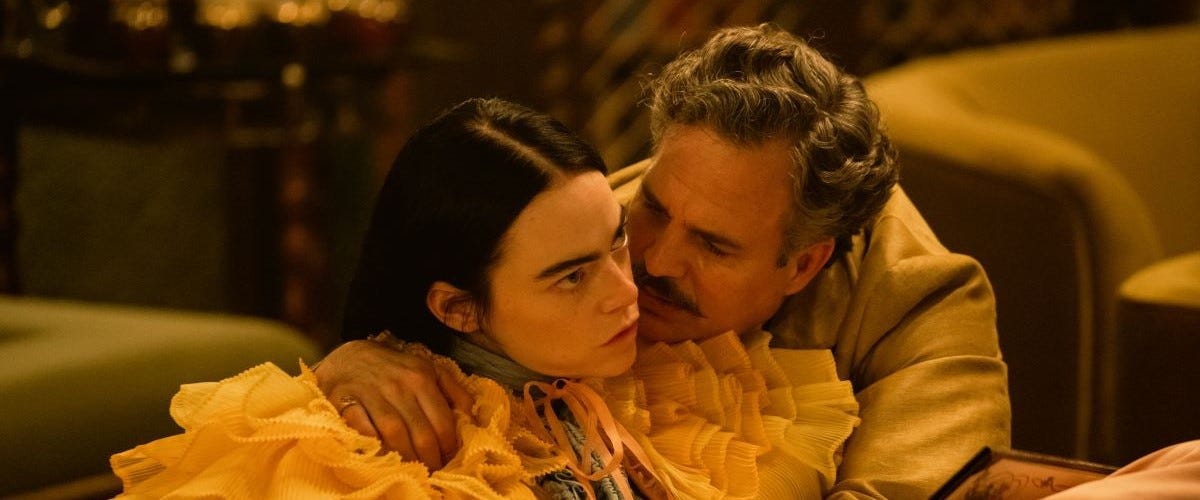Poor Things Makes Vivisecting the Patriarchy Look Easy
Maybe too easy.
An artificial innocent in a woman’s body breaks out of her sheltered, constructed life and goes on a quest for experience and knowledge which will eventually lead her to real womanhood.
That’s the plot of Barbie. And it’s also the plot of Yorgos Lanthimos Poor Things, a movie which, despite surface dissimilarities, ends up being in many ways a lot more akin to the glitzy movie about the doll than to the Alasdair Gray’s metafictional puzzle of a novel which is supposed to be the inspiration.
The movie Poor Things starts in an opulent, saturated, steampunk version of Victorian London, where aged, scarred surgeon Dr. Godwin Baxter (Willem Dafoe) performs Frankensteinesque experiments, making chicken-pigs and goose dogs. His greatest triumph, though, is Bella (Emma Stone), who came to Godwin (or God, as she calls him) as a corpse. Her former self committed suicide, and God resurrected her by placing the brain of her unborn child in her skull.
At first Bella appears to be mentally deficient, but she learns quickly, especially as far as sexual matters are concerned. In part to slake her libido, God encourages her to marry his student Max (Ramy Youssef). But before the nuptials, Bella runs off with lawyer and rake Duncan Wedderburn (Mark Ruffalo). They travel across Europe and North Africa, as Bella learns more of sexuality, food, dancing, philosophy, and male sexism.
As with Barbie, Bella’s innocence is both a foil for and a weapon against patriarchy. She doesn’t know that she is supposed to behave with demure deference, and so she refuses to subordinate her desires or ambitions for male convenience. Stone’s performance initially is an uncomfortable and I think ill-advised parody of mental disability, as she jerks awkwardly about the mansion, breaking plates and peeing on the floor. But slowly Lanthimos allows her to settle into a more subtle portrayal. By the middle of the film, her fixed stare and odd head tilt convey an unswayable focus that drives Duncan to distraction and worse than distraction.
In Barbie, Margot Robbie’s independence is kept within certain careful bounds; she has few desires for herself (as I discussed in this essay). The feminist empowerment she seeks is one that feels safe because it isn’t driven by hunger. Bella, in contrast, is all id. Whatever she wants, she wants intensely, and heads towards it with a pitiless passion that has no regard for propriety or for the property claims of men that so often define propriety.
The problem is that those passions are relatively unvaried. Barbie has no sexual desire, but sex sometimes seems like the only desire Bella has. It’s true she becomes fascinated with Emerson briefly, and then with helping the poor, and after that with socialism. But these interests all receive little screentime compared to her athletic rutting with Duncan or with a series of men when she starts working in a brothel. It makes sense thematically that one of the men who wants to control her proposes to circumcise her; her sexual desire is the symbol of her quest for freedom. Sex isn’t the only thing she wants, but she wants sex (or, as she calls it, “furious jumping”) so much that it becomes the thing that symbolizes all the others.
Acknowledgement of women’s sexual autonomy and sexual desire is obviously feminist. At the same time, when a male director is so much more interested in his female heroine’s sexual education than he is in her philosophical one, you do start to wonder. Alasdair Gray’s novel acknowledged and played with the tension between female agency and male gaze by using multiple narrative voices and unreliable narrators—there’s at least a suggestion in the book that the grotesque gothic brain transference, and the sexual exploits, are a fever dream cooked up by Bella’s husband. For Gray, the story about Bella defying and escaping male expectations is itself a kind of cage which traps Bella in male expectations.
The movie is not interested in that kind of self-reflection or self-questioning. Like Barbie, Poor Things is, for all its stylish oddness, ultimately an empowerment fantasy, in which Bella, that modern construction, learns she can have it all—wild sex, a devoted husband, and a stimulating career.
That career, by the way, is surgeon; Bella realizes, after being away, that she loves the dissecting room and wants to make God’s pursuit of science her own. You could see this as the final step in her own self-fashioning; she is learning to seize control of the methods which first turned her into her own mother. But she’s also following in the father’s footsteps. All those travels and all that questing, and ultimately she acts the dutiful daughter and takes up the family business—a business of shaping herself to fit the business. Patriarchy made her, and patriarchy sneaks back into her home and her brain at the end to claim its prize.
This isn’t to say that Poor Things is unfeminist, any more than Barbie is unfeminist. They’re both films that show some of the ways that women are oppressed, and both insist that that oppression is wrong. They also, though, present a very Hollywood vision in which feminist victories arrive with an ease that could be uncharitably described as glib. In Don’t Worry, Darling or Eileen, patriarchy is harder to escape; the protagonists are left, at the movies’ conclusion, freer, but not necessarily free, and with a freight of scars and heartbreak. Poor Things, in contrast, gives Bella everything she wants. That’s satisfying, but it also makes of Bella something of a plastic doll. She doesn’t feel quite real.




Ok, so it is fantastically disappointing and filled with Lanthimos disturbing imagery to no real end. Just self indulgent.
I personally enjoyed the film. No film is perfect and while I respect your opinions on this one I have to say for me it succeeds a little better than your experience.